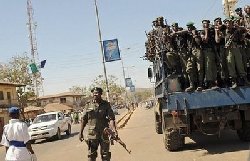Awalu Mohamed was one of the first to arrive in the mining village of Kuru Karama to discover burned human remains and corpses thrown into communal wells and sewage pits.
"There are so many, many corpses," says Mohamed, of the Jamatu Nasril Islam aid group.
He described how 62 corpses were pulled from the wells on the first day, but aid workers had no equipment to reach those further down.
"We went to one family and found the entire family there, 20-something of them, including the small, small kids. All of them burned to ashes," he says.
He covers his eyes.
He - and other aid workers - realized they were overwhelmed.
Mohamed described how they removed the family's remains, piece by piece.
They added them to the other corpses inside the wells. These wells are now being sand-filled, to become mass graves.
Around the village, more bodies are being found every day.
Those who tried to run from the gangs were hunted and cut down with machetes and guns around the settlement.
"We could hear the noise. They were singing and chanting, they destroyed everything," says 20-year-old Zainab Sanusi.
"They burned our house. We are left with nothing now, nothing."
She fled her home, on the edge of Jos, to join 2,000 other people now eating, washing and sleeping together in cramped classrooms at a local primary school.
'Homes razed'
Across the region, many thousands are displaced. Everyone has a story to tell.
"Suddenly, a team of security personnel entered our village," says Mohamed Kabir Mohamed, a miner from Anglo Jos village.
"They told us to evacuate. They were chasing us out, allowing people in to burn our houses.
"Later we realized those police and military men were fake, they were not wearing the proper uniform, the normal military boots.
"When we talked, they opened fire against us. As we left, our enemies were busy razing our homes."
He and his friends saw very clearly who attacked the village.
''That is the worst part,'' he says.
''Of those that came, there were known and unknown faces. The worst part is that those who were known, were our friends.''
The BBC drove through burned out suburbs, villages, and tiny settlements.
The Bukuru Markets area - once a roaring hive of shops - is now a blackened bonfire under a blue sky.
At least 1,000 businesses here were burned.
It was after midnight and people were sleeping when a gang attacked, starting an inferno.
Many people were too disoriented to talk - or too angry to make sense.
The nearby mosque say they received 31 corpses.
The number is hard to believe. It seems too low.
Jos sits on a tense dividing line between Nigeria's mostly Hausa-speaking Muslim north, and the south where the majority is Christian.
The town is predominantly Christian, with Hausa Muslims in the minority.
But people here respect faith. Everyone insists this violence is not about religion.
It is about politics, they say.
Jos has an ugly history of violence at election times.
Local politicians are accused of orchestrating violence to rig elections and intimidate their rivals.
This time, there are accusations the violence is an organized campaign to drive Hausa Muslims out of the state.
The state government denies that. It says it has given 30 million naira ($200,000; £123,000) to help the victims of the violence.
PHOTO CAPTION
Anti-riot policemen patrol the streets in Jos, Nigeria, in 2008.
Source: BBC


 Home
Home Discover Islam
Discover Islam Quran Recitations
Quran Recitations Lectures
Lectures
 Fatwa
Fatwa Articles
Articles Fiqh
Fiqh E-Books
E-Books Boys & Girls
Boys & Girls  Articles
Articles










